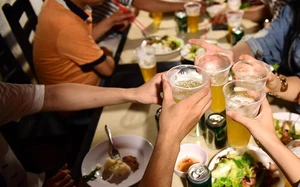
Op-ed: After-work drinking isn’t disappearing in Vietnam, but it’s evolving
"For years, this was the rhythm of life: finishing work, heading to the beer hall, and toasting until late."
Editor’s note: This piece is written by Darren Chua, a Singaporean who has lived in Vietnam for over 12 years. It presents his viewpoint on the after-work drinking culture in Vietnam and has been edited by Tuoi Tre News for clarity and comprehensiveness.
After 12 years in Vietnam, I’ve seen how central after‑work drinking is to daily life. Beer—especially bia hoi—has never just been about alcohol. It’s about camaraderie, loyalty, and the unspoken bonds that form when colleagues or clients raise their glasses together. For someone like me who doesn’t enjoy drinking, it was initially intimidating. But over time, I came to respect its necessity. In Vietnam, saying no to a drink could feel like saying no to a relationship.
Yet things are changing. Stricter laws, the disruption of COVID-19, and shifting generational preferences are reshaping this ritual. Drinking isn’t disappearing, but it’s evolving.
The traditional role of drinking can be seen through business ties, as many deals were sealed over beer, not in boardrooms; through social bonding as drinking was a way to show respect and build trust; and through inclusivity – from farmers to office workers, it cut across class lines.
For years, this was the rhythm of life: finishing work, heading to the beer hall, and toasting until late.
The impact of changing laws
Vietnam’s government has introduced bold measures to curb alcohol consumption, including zero‑tolerance drink‑driving law in 2019. Any trace of alcohol in the bloodstream now leads to heavy fines and license suspension.
Alcohol tax hikes are also being counted. In 2025, the National Assembly approved plans to raise alcohol taxes from 65 percent to 90 percent by 2031.
Added to those are public health campaigns, with authorities increasingly framing alcohol as a national health risk, akin to smoking.
These measures have reshaped habits. Drinking is no longer seen as harmless bonding but as something shadowed by legal and financial consequences.
Comparative lens: Singapore’s experience
Singapore provides a useful benchmark. In November 2025, veteran lawyer Steven John Lam was jailed for eight weeks, fined S$18,000, and banned from driving for six years after crashing into railings while being drunk and lying to police that he was not the driver.
This case was striking not only because Lam was a seasoned criminal lawyer but because it showed how unforgiving Singapore’s system is toward drunk driving.
Vietnam’s new legal framework reflects a similar trajectory: governments across Asia are reframing alcohol not as a cultural necessity but as a public safety issue.
COVID‑19: The great disruptor
COVID‑19 accelerated this cultural shift. During lockdowns, after‑work gatherings vanished. Even when restrictions eased, many were reluctant to return to crowded beer halls. Habits changed to home‑based leisure as families spent more time together, reducing the appeal of nightly drinking sessions.
Health consciousness is also raised, as the pandemic heightened awareness of personal health, making alcohol less attractive.
Meanwhile, digital networking plays a role as business relationships increasingly move online, reducing reliance on face‑to‑face drinking rituals.
The pandemic broke the ritual, and not everyone wanted to rebuild it.
Generational shifts
Vietnam’s younger generation is more globalized, health‑conscious, and digitally connected. Many prefer coffee shops, gyms, or online communities over smoky beer halls. Drinking remains part of the culture, but it is no longer the default.
This mirrors Singapore’s own evolution. In the 1980s, long lunches and drinking were common in business circles, but today, efficiency and wellness dominate. Vietnam seems to be following a similar trajectory, albeit at its own pace.
The ride‑hailing factor
Despite stricter laws, drinking hasn’t vanished. The rise of ride‑hailing apps like Grab and Vietnam’s electric taxi service Xanh SM has given people a convenient workaround. Many now leave their motorbikes at home, knowing they can book a safe ride after a few beers.
This has softened the impact of the drink‑driving crackdown. While the law discourages risky behavior, technology enables people to keep the tradition alive—albeit with more caution.
Respecting tradition, recognizing change
Drinking will always hold cultural significance in Vietnam. It remains a way to demonstrate respect and solidarity. But the necessity is less absolute. Laws, the COVID-19 pandemic, and generational change have created space for alternatives: coffee meetings, fitness clubs, and karaoke are emerging as substitutes.
At the same time, ride‑hailing apps ensure that those who still want to drink can do so more safely. The culture is not dying—it’s adjusting, balancing tradition with modern priorities.
So, is after‑work drinking culture dying in Vietnam? Not dead, but evolving. The government’s legal interventions, the COVID-19 disruption, and generational preferences are reshaping the landscape. Drinking will remain a cultural pillar, but its dominance is waning.
For someone like me, this evolution feels like a relief. It respects tradition while opening space for alternatives. Vietnam’s drinking culture is not disappearing—it’s transforming, adapting to new laws, new technologies, and new lifestyles.
Tuoi Tre News
Link nội dung: https://news.tuoitre.vn/op-ed-drinking-in-vietnam-isnt-disappearing-but-its-evolving-103251119142500036.htm
